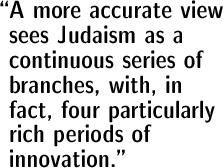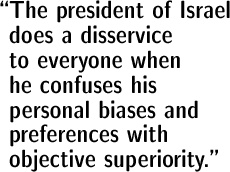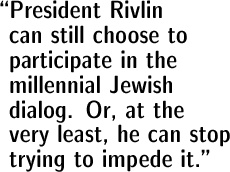President Rivlin’s Tragic Misunderstanding of Jewish History (Or, Will the Original Judaism Please Stand Up?)
The current president of Israel rejects Judaism as practiced by most of the world’s Jews.
Already, that is an unfortunate state of affairs. But what makes it worse in my opinion is that the president’s narrow-minded beliefs are based in misunderstanding and are the result of (probably inadvertent) brainwashing.
According to the JTA, President Reuven Rivlin told the Knesset in 2006 that “the status of Judaism according to halachah [Jewish law] is what has kept us going for 3,800 years. Besides it there is nothing.”
He is factually incorrect in many ways.
 To start, halachah was born after the Jewish exile in the year 70, so it is, at most, 1,944 years old, not 3,800. Judaism did just fine without it for about a millennium, when Jewish service to God took the form of animal sacrifice. The enactment of halachah was a reformation of Judaism, or, as we call it more colloquially, part of a reform movement.
To start, halachah was born after the Jewish exile in the year 70, so it is, at most, 1,944 years old, not 3,800. Judaism did just fine without it for about a millennium, when Jewish service to God took the form of animal sacrifice. The enactment of halachah was a reformation of Judaism, or, as we call it more colloquially, part of a reform movement.
In fact, most of modern Judaism’s public symbols — thrice daily prayer services, Sabbath candles, current dietary laws (“keeping kosher”), the familiar matzah, etc. — didn’t exist 2,000 years ago. They were all reforms.
President Rivlin’s gross misunderstanding of the history of the country that just elected him might be forgiven — after all, he’s a politician, not an historian — except that he chose to present his revisionism before the Knesset, and continues to promulgate it in his official capacity.
President Rivlin, like many people, is suffering from a double misunderstanding. He thinks that Judaism has never changed. And he thinks that Orthodoxy is more authentic than its alternatives. In other words, President Rivlin wrongly thinks of Judaism as a straight line from antiquity to modern Orthodoxy, with deviations shooting off from time to time in the wrong directions.
 A more accurate view sees Judaism as a continuous series of branches, with, in fact, four particularly rich periods of innovation.
A more accurate view sees Judaism as a continuous series of branches, with, in fact, four particularly rich periods of innovation.
Two examples demonstrate. The first concerns travel on the Sabbath, the second, the ceremonial skullcap commonly called a yarmulke or kippah.
Jewish law used to forbid travel on the Sabbath. Then transatlantic ships were invented, and Jews had a choice: they could refuse to travel from continent to continent (because the lengthy journey necessarily included the Sabbath). Or they could update their laws. They chose the latter, retaining only a nod to tradition in the form of not embarking or disembarking on the Sabbath.
A detail is equally to the point: The Shulchan Aruch — the 16th-century authoritative compendium of Jewish law — prohibits setting out to sea within three days of the Sabbath (Orech Chaim 248). The reasoning there was that the Sabbath shouldn’t be marred by the discomfort and confusion that accompany the start of an ocean voyage. But even modern Jews who follow halachah break this aspect of Jewish law.
The second example is the kippah or yarmulke. Common perception is that Jews are always supposed to wear a kippah in public. But, in fact, it wasn’t until the 16th century (in the same Shulchan Aruch) that the wearing of a kippah was codified. Before that, the 12th-century Maimonides ruled that a Jew’s head should be covered only during prayer. For most of Jewish history, Jews did not wear a kippah in public.
 These two examples show that modern Orthodoxy sometimes ignores old laws and sometimes invents new ones. That’s fine, of course, and my point here is not to belittle Orthodox practice. But, equally, let us not believe that only progressive Judaism purposely changes the past, or that Orthodoxy most closely resembles what used to be. In this case (by chance), the progressive practice of donning a kippah for worship services is older than the revisionist Orthodox pattern of wearing one all the time.
These two examples show that modern Orthodoxy sometimes ignores old laws and sometimes invents new ones. That’s fine, of course, and my point here is not to belittle Orthodox practice. But, equally, let us not believe that only progressive Judaism purposely changes the past, or that Orthodoxy most closely resembles what used to be. In this case (by chance), the progressive practice of donning a kippah for worship services is older than the revisionist Orthodox pattern of wearing one all the time.
But the details are only important here because of the larger pattern they demonstrate: Judaism has constantly evolved. The president of Israel does a disservice to everyone when he confuses his personal biases and preferences with objective superiority.
As it happens, Judaism has seen four particularly productive periods of innovation (as I point out in one of my most popular presentations, “Four Exiles and Four Spiritual Revolutions”). The prophets revised Judaism, broadening Jewish attention beyond the Jewish community. The Rabbis invented halachah. And the Kabbalists created a unique form of Jewish mysticism, to say nothing of the bulk of the Friday evening worship service.
 We are witnessing the fourth major period of Jewish innovation in 3,000 years. Contributing to it are formal movements like Reform, Conservative, and Reconstructionist; philosophical approaches like Modern Orthodoxy; organizations like Chabad; populist movements that define many mainstream Israelis; and more. I am convinced that historians someday will look back at the 21st century with the same awe and reverence with which we now view the eras of the biblical prophets and the Rabbis.
We are witnessing the fourth major period of Jewish innovation in 3,000 years. Contributing to it are formal movements like Reform, Conservative, and Reconstructionist; philosophical approaches like Modern Orthodoxy; organizations like Chabad; populist movements that define many mainstream Israelis; and more. I am convinced that historians someday will look back at the 21st century with the same awe and reverence with which we now view the eras of the biblical prophets and the Rabbis.
It is a privilege to live through this incredibly exciting time.
And the president of Israel is being left behind. But it’s not too late. President Rivlin can still choose to participate constructively in the millennial Jewish dialog. Or, at the very least, he can stop trying to impede it.




Joel, this is excellent. your cogent and well illustrated argument should be required reading for all orthodox and non orthodox jews.
Joel – This is most excellent – cogently argued and well illustrated. It should be required reading for orthodox and non orthodox alike.
Rabbi David B. Cohen
Instead of appreciating Rivlin’s references to Judaism, however technically inaccurate, the writer uses the opportunity to attack him and current Orthodox normative beliefs.